Arpan Rai
THE INDEPENDENT
Mon 7 October 2024
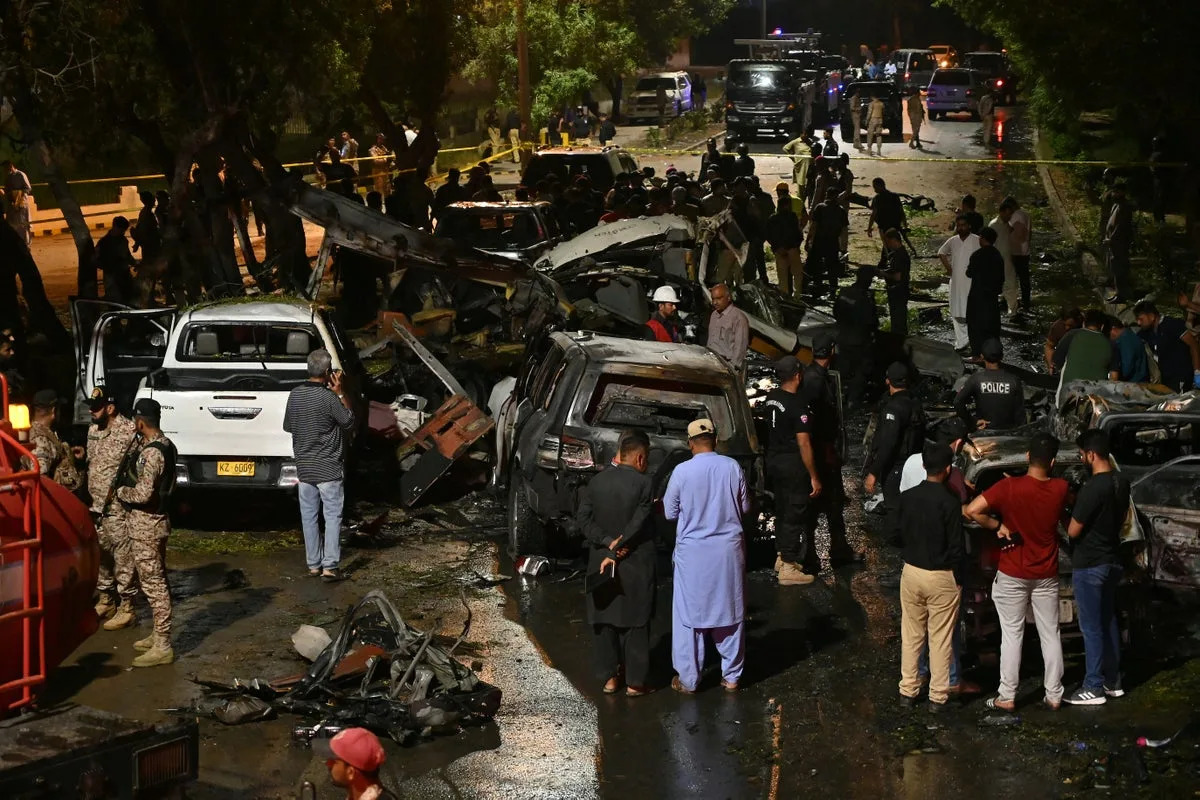
Why Chinese workers are under attack from militants in Afghanistan and Pakistan
As Chinese workers and development projects increasingly come under attack in Pakistan, security experts say separatist militants see the foreign presence as a threat to local resources and their grip on the restive South West.
Two Chinese nationals were killed in a bombing near the international airport of the southern Pakistani city of Karachi on Sunday. The attack, which took place around 11pm outside Pakistan’s Jinnah International Airport, targeted a van of Chinese nationals, just a week before the high-level Shanghai Cooperation Organization (SCO).
Shortly after, separatist militant group, Baloch Liberation Army (BLA), from Pakistan’s troubled southwestern Balochistan province claimed responsibility, stating that it used a vehicle-borne improvised explosive device targeting “a high-level convoy of Chinese engineers and investors”.
China has supported its smaller Asian allies Pakistan and Afghanistan with financial and infrastructure aid for decades and invested significantly in its defence and technology. But its resources are now prime targets for dozens of terrorist groups in the region, experts said.
“Sunday night’s attack is part of a larger pattern of attacks by Baloch separatist militants and Pakistani Taliban factions targeting Chinese nationals and interests in Pakistan,” said security analyst Ihsanullah Tipu Mehsud.
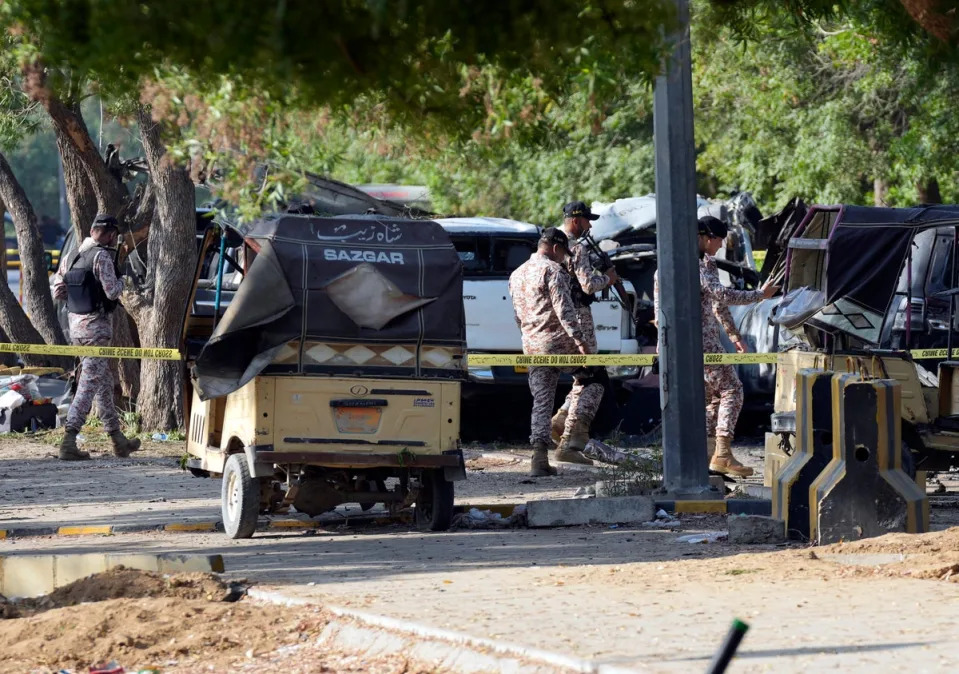
Security officials work on the site of an explosion that caused injures and destroyed vehicles outside the Karachi airport, Pakistan, Monday, 7 Oct 2024 (Copyright 2024 The Associated Press. All rights reserved.)
This is one of the biggest terrorist attacks since 2018 targeting Chinese workers in Pakistan, Mr Mehsud told The Independent, including the November 2018 attack on Karachi Chinese Consulate which killed four, July 2021’s Dasu suicide attack which killed nine Chinese nationals, BLA’s attack on the Pakistan Stock Exchange in June 2020, and their suicide attack in April 2023 which killed three Chinese tutors.
This is the second major attack on Chinese nationals. Earlier in March, a suicide car bombing killed five Chinese workers in Pakistan’s Shangla district. The Chinese engineers, who were employed on the site of a hydropower project in northwestern Khyber Pakhtunkhwa province bordering Afghanistan, were on their way to the Dasu Dam In Afghanistan. The December 2022 attack targeted Kabul’s China Town and wounded five Chinese nationals in a hotel where Beijing’s investors were staying.
“The Baloch militants’ propaganda is heavily focused on Chinese presence in Balochistan and they consider it as a threat to their influence and resources. They believe China’s financial and technical assistance to Pakistan strengthens the government’s grip on the region, undermining their activities and influence,” said Mr Mehsud, who is also the co-founder of The Khorasan Diary, a digital news and research platform specialising in tracking and analysing militancy in the region.
This perception fuels their attacks on Chinese nationals, investments, and projects, he added.
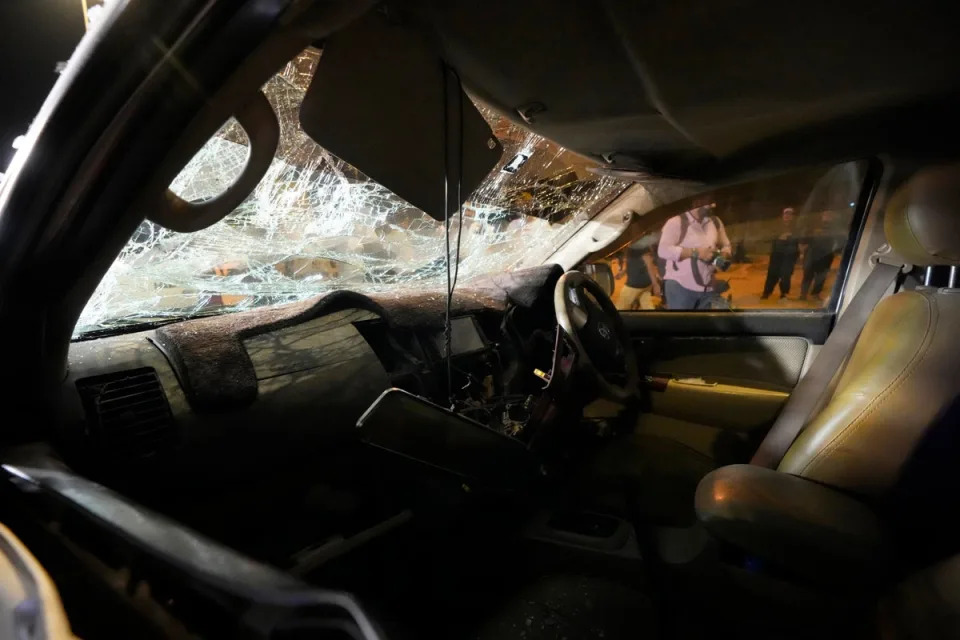
A car is seen damaged at the site of an explosion that caused injures and destroyed vehicles outside the Karachi airport, Pakistan, Monday, 7 Oct 2024 (Copyright 2024 The Associated Press. All rights reserved.)
“This is not merely an attack but a larger security and intelligence failure by Pakistan in protecting Chinese nationals, mostly engineers working on major projects,” said Abdullah Khan, a senior defence analyst and managing director of the Islamabad-based Pakistan Institute for Conflict and Security Studies.
“They also show something critical: most of the attacks are moving targets and vehicles in transit carrying workers,” he said, adding that it meant there was obviously a security breach.
The BLA seeks independence for the province of Balochistan, located in Pakistan’s southwest and bordering on Afghanistan and Iran. BLA specifically targets Chinese interests, in particular the strategic port of Gwadar on the Arabian Sea, accusing Beijing of helping Islamabad exploit the province.
Security issues have affected China’s billions of planned investments, including under China-Pakistan Economic Corridor which is part of Chinese president Xi Jinping’s Belt and Road.
In August prime minister Shehbaz Sharif said the attacks by separatist militants were aimed at stopping development projects that form part of the China-Pakistan Economic Corridor (CPEC). “The terrorists want to stop CPEC and development projects,” he said in a televised address to cabinet, adding that the militants also wanted to drive a wedge between Islamabad and Beijing.
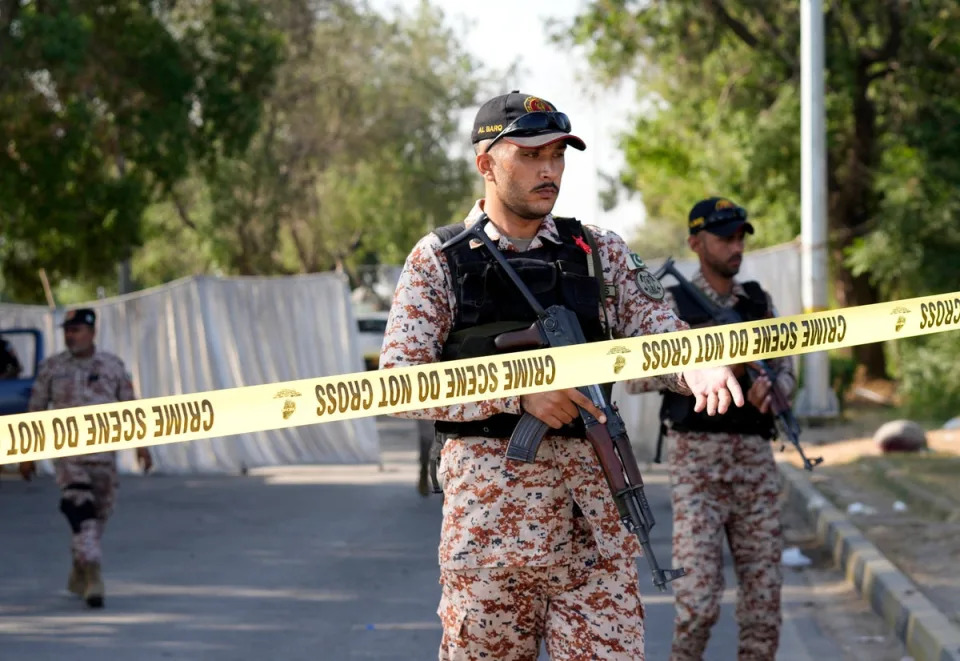
Security officials stand guard at the site of an explosion that caused injures and destroyed vehicles outside the Karachi airport, Pakistan, Monday, 7 Oct 2024 (Copyright 2024 The Associated Press. All rights reserved.)
But the predictable civilian losses will not deter China from sending its nationals to the region, Mr Khan added, stating that Mr Xi visited Pakistan in April 2015 for the massive CPEC project investment when the country was facing its worst surge in terrorism.
“The Chinese are very much aware that this is a conflict zone where they are pursuing these projects because when they had started the CPEC in Pakistan in 2015, that was the time Pakistan was facing the highest degree of terrorism in the country with tremendous terrorist attacks in 2014,” Mr Khan said.
“Their investment projects are development projects in Pakistan which they will continue despite these challenges,” he said.
Pakistan is preparing to host the SCO summit in capital Islamabad, which was roiled by protests and clashes over the weekend between police and supporters of jailed former prime minister Imran Khan. High-level Chinese representation and the first visit by an Indian foreign minister in a decade are expected at the summit next week, which authorities have vowed to secure.
A Pakistani separatist group claims bombing that killed 2 Chinese near Karachi airport
Mon 7 October 2024

Why Chinese workers are under attack from militants in Afghanistan and Pakistan
As Chinese workers and development projects increasingly come under attack in Pakistan, security experts say separatist militants see the foreign presence as a threat to local resources and their grip on the restive South West.
Two Chinese nationals were killed in a bombing near the international airport of the southern Pakistani city of Karachi on Sunday. The attack, which took place around 11pm outside Pakistan’s Jinnah International Airport, targeted a van of Chinese nationals, just a week before the high-level Shanghai Cooperation Organization (SCO).
Shortly after, separatist militant group, Baloch Liberation Army (BLA), from Pakistan’s troubled southwestern Balochistan province claimed responsibility, stating that it used a vehicle-borne improvised explosive device targeting “a high-level convoy of Chinese engineers and investors”.
China has supported its smaller Asian allies Pakistan and Afghanistan with financial and infrastructure aid for decades and invested significantly in its defence and technology. But its resources are now prime targets for dozens of terrorist groups in the region, experts said.
“Sunday night’s attack is part of a larger pattern of attacks by Baloch separatist militants and Pakistani Taliban factions targeting Chinese nationals and interests in Pakistan,” said security analyst Ihsanullah Tipu Mehsud.

Security officials work on the site of an explosion that caused injures and destroyed vehicles outside the Karachi airport, Pakistan, Monday, 7 Oct 2024 (Copyright 2024 The Associated Press. All rights reserved.)
This is one of the biggest terrorist attacks since 2018 targeting Chinese workers in Pakistan, Mr Mehsud told The Independent, including the November 2018 attack on Karachi Chinese Consulate which killed four, July 2021’s Dasu suicide attack which killed nine Chinese nationals, BLA’s attack on the Pakistan Stock Exchange in June 2020, and their suicide attack in April 2023 which killed three Chinese tutors.
This is the second major attack on Chinese nationals. Earlier in March, a suicide car bombing killed five Chinese workers in Pakistan’s Shangla district. The Chinese engineers, who were employed on the site of a hydropower project in northwestern Khyber Pakhtunkhwa province bordering Afghanistan, were on their way to the Dasu Dam In Afghanistan. The December 2022 attack targeted Kabul’s China Town and wounded five Chinese nationals in a hotel where Beijing’s investors were staying.
“The Baloch militants’ propaganda is heavily focused on Chinese presence in Balochistan and they consider it as a threat to their influence and resources. They believe China’s financial and technical assistance to Pakistan strengthens the government’s grip on the region, undermining their activities and influence,” said Mr Mehsud, who is also the co-founder of The Khorasan Diary, a digital news and research platform specialising in tracking and analysing militancy in the region.
This perception fuels their attacks on Chinese nationals, investments, and projects, he added.

A car is seen damaged at the site of an explosion that caused injures and destroyed vehicles outside the Karachi airport, Pakistan, Monday, 7 Oct 2024 (Copyright 2024 The Associated Press. All rights reserved.)
“This is not merely an attack but a larger security and intelligence failure by Pakistan in protecting Chinese nationals, mostly engineers working on major projects,” said Abdullah Khan, a senior defence analyst and managing director of the Islamabad-based Pakistan Institute for Conflict and Security Studies.
“They also show something critical: most of the attacks are moving targets and vehicles in transit carrying workers,” he said, adding that it meant there was obviously a security breach.
The BLA seeks independence for the province of Balochistan, located in Pakistan’s southwest and bordering on Afghanistan and Iran. BLA specifically targets Chinese interests, in particular the strategic port of Gwadar on the Arabian Sea, accusing Beijing of helping Islamabad exploit the province.
Security issues have affected China’s billions of planned investments, including under China-Pakistan Economic Corridor which is part of Chinese president Xi Jinping’s Belt and Road.
In August prime minister Shehbaz Sharif said the attacks by separatist militants were aimed at stopping development projects that form part of the China-Pakistan Economic Corridor (CPEC). “The terrorists want to stop CPEC and development projects,” he said in a televised address to cabinet, adding that the militants also wanted to drive a wedge between Islamabad and Beijing.

Security officials stand guard at the site of an explosion that caused injures and destroyed vehicles outside the Karachi airport, Pakistan, Monday, 7 Oct 2024 (Copyright 2024 The Associated Press. All rights reserved.)
But the predictable civilian losses will not deter China from sending its nationals to the region, Mr Khan added, stating that Mr Xi visited Pakistan in April 2015 for the massive CPEC project investment when the country was facing its worst surge in terrorism.
“The Chinese are very much aware that this is a conflict zone where they are pursuing these projects because when they had started the CPEC in Pakistan in 2015, that was the time Pakistan was facing the highest degree of terrorism in the country with tremendous terrorist attacks in 2014,” Mr Khan said.
“Their investment projects are development projects in Pakistan which they will continue despite these challenges,” he said.
Pakistan is preparing to host the SCO summit in capital Islamabad, which was roiled by protests and clashes over the weekend between police and supporters of jailed former prime minister Imran Khan. High-level Chinese representation and the first visit by an Indian foreign minister in a decade are expected at the summit next week, which authorities have vowed to secure.
A Pakistani separatist group claims bombing that killed 2 Chinese near Karachi airport
ADIL JAWAD and MUNIR AHMED
AP
Mon 7 October 2024
KARACHI, Pakistan (AP) — A Pakistani separatist group claimed responsibility for a late-night bombing that targeted a convoy with Chinese nationals outside the country's largest airport, killing two workers from China and wounding eight people, officials and the insurgent group said Monday.
The attack by the Baloch Liberation Army outside the airport in the southern port city of Karachi was the latest deadly assault on the Chinese in Pakistan and came a week before Islamabad is to host a summit of the Shanghai Cooperation Organization, a security grouping founded by China and Russia to counter Western alliances.
The explosion, which the BLA said was the work of a suicide bomber, also raised questions about the ability of Pakistani forces to secure high-profile events or foreigners in the country. Among the wounded were also police officers who were escorting the Chinese convoy when the attack happened.
Pakistani news channels broadcast videos of flames engulfing cars and a thick column of smoke rising from the scene. Troops and police cordoned off the area. On Monday, counterterrorism officials were investigating how the attacker reached Karachi, Pakistan's largest city.
The spokesman for the separatist group, Junaid Baloch, said Monday that one of their suicide bombers targeted the convoy of Chinese engineers and investors as they left the airport. The Baloch Liberation Army is mainly based in the restive southwestern Balochistan province but it has also attacked foreigners and security forces in other parts of Pakistan in recent years.
The Chinese Embassy in Islamabad said Chinese staffers working at the Port Qasim Electric Power Company — a coal-powered power plant that's a joint China-Pakistan venture — were in the convoy when it came under attack around 11 p.m. on Sunday. Two Chinese nationals were killed and one was wounded, the embassy said and added, without elaborating, that there were also Pakistani casualties.
Pakistani security officials say a police bomb disposal unit in Sindh province, where Karachi is the capital, had cleared the road outside the airport ahead of the movement of the Chinese convoy, which was being escorted by police and security officials in several vehicles.
Pakistan's Ministry of Foreign Affairs denounced the bombing, saying it was a “heinous terrorist attack near Karachi airport.”
Pakistan's Prime Minister Shehbaz Sharif said he was shocked and saddened, describing the attackers as “enemies of Pakistan” and promising the perpetrators would be punished.
“I strongly condemn this heinous act and offer my heartfelt condolences to the Chinese leadership & the people of China, particularly the families of the victims,” he wrote on the social media platform X.
“Pakistan stands committed to safeguarding our Chinese friends," he added. "We will leave no stone unturned to ensure their security & well-being.”
Later, Sharif met with the Chinese Ambassador Jiang Zaidong to assure him that he would personally supervise the investigation into the attack.
Earlier, Interior Minister Mohsin Naqvi briefed Zaidong about the investigations.
Authorities estimate that the BLA, which Pakistan and the United States have designated a terrorist organization, has around 3,000 fighters. It regularly targets Pakistani security forces but has also in the past attacked Chinese nationals.
According to Abdullah Khan, a senior defense analyst and managing director of the Islamabad-based Pakistan Institute for Conflict and Security Studies, BLA has preferred attacks on “moving targets” but its ability to launch high-profile attacks has increased in recent years.
More BLA attacks around the Shanghai Cooperation Organization summit next week cannot be ruled out, Khan told The Associated Press.
Pakistan hosts thousands of Chinese workers as part of Beijing’s multibillion-dollar Belt and Road Initiative, which is building major infrastructure projects.
The outlawed BLA has long waged an insurgency seeking independence and has repeatedly warned against any Chinese working in Balochistan.
The Sunday night attack followed deadly attacks in August that killed more than 50 people in Balochistan. Sharif at the time said the attackers sought to harm Chinese-funded development projects.
The oil- and mineral-rich Balochistan is Pakistan’s largest but also least populated province. It is also a hub for the country’s ethnic Baloch minority whose members say they face discrimination and exploitation by the central government. Along with separatist groups, Islamic militants also operate in the province.
In March, in northwestern Pakistan, a suicide bombing killed five Chinese engineers and their Pakistani driver as they headed to the Dasu Dam, the country's biggest hydropower project. In April, five Japanese workers were unharmed when a suicide bomber targeted their van as they were on their wat to a factory in Karachi. One bystander was killed.
In July 2021, at least nine Chinese nationals working on a dam and four Pakistanis were killed when a suicide bomber targeted their bus in northwestern Pakistan. Local authorities first said it was a road accident but Beijing insisted it was a bombing, which Islamabad later confirmed.
In 2022, three Chinese teachers and their Pakistani driver were killed when an explosion ripped through their van at the University of Karachi campus.
___
Ahmed reported from Islamabad. Associated Press writer Ken Moritsugu and AP researcher Yu Bing in Beijing contributed to this report.
Chinese workers targeted in deadly Pakistan airport suicide blast
Mon 7 October 2024
KARACHI, Pakistan (AP) — A Pakistani separatist group claimed responsibility for a late-night bombing that targeted a convoy with Chinese nationals outside the country's largest airport, killing two workers from China and wounding eight people, officials and the insurgent group said Monday.
The attack by the Baloch Liberation Army outside the airport in the southern port city of Karachi was the latest deadly assault on the Chinese in Pakistan and came a week before Islamabad is to host a summit of the Shanghai Cooperation Organization, a security grouping founded by China and Russia to counter Western alliances.
The explosion, which the BLA said was the work of a suicide bomber, also raised questions about the ability of Pakistani forces to secure high-profile events or foreigners in the country. Among the wounded were also police officers who were escorting the Chinese convoy when the attack happened.
Pakistani news channels broadcast videos of flames engulfing cars and a thick column of smoke rising from the scene. Troops and police cordoned off the area. On Monday, counterterrorism officials were investigating how the attacker reached Karachi, Pakistan's largest city.
The spokesman for the separatist group, Junaid Baloch, said Monday that one of their suicide bombers targeted the convoy of Chinese engineers and investors as they left the airport. The Baloch Liberation Army is mainly based in the restive southwestern Balochistan province but it has also attacked foreigners and security forces in other parts of Pakistan in recent years.
The Chinese Embassy in Islamabad said Chinese staffers working at the Port Qasim Electric Power Company — a coal-powered power plant that's a joint China-Pakistan venture — were in the convoy when it came under attack around 11 p.m. on Sunday. Two Chinese nationals were killed and one was wounded, the embassy said and added, without elaborating, that there were also Pakistani casualties.
Pakistani security officials say a police bomb disposal unit in Sindh province, where Karachi is the capital, had cleared the road outside the airport ahead of the movement of the Chinese convoy, which was being escorted by police and security officials in several vehicles.
Pakistan's Ministry of Foreign Affairs denounced the bombing, saying it was a “heinous terrorist attack near Karachi airport.”
Pakistan's Prime Minister Shehbaz Sharif said he was shocked and saddened, describing the attackers as “enemies of Pakistan” and promising the perpetrators would be punished.
“I strongly condemn this heinous act and offer my heartfelt condolences to the Chinese leadership & the people of China, particularly the families of the victims,” he wrote on the social media platform X.
“Pakistan stands committed to safeguarding our Chinese friends," he added. "We will leave no stone unturned to ensure their security & well-being.”
Later, Sharif met with the Chinese Ambassador Jiang Zaidong to assure him that he would personally supervise the investigation into the attack.
Earlier, Interior Minister Mohsin Naqvi briefed Zaidong about the investigations.
Authorities estimate that the BLA, which Pakistan and the United States have designated a terrorist organization, has around 3,000 fighters. It regularly targets Pakistani security forces but has also in the past attacked Chinese nationals.
According to Abdullah Khan, a senior defense analyst and managing director of the Islamabad-based Pakistan Institute for Conflict and Security Studies, BLA has preferred attacks on “moving targets” but its ability to launch high-profile attacks has increased in recent years.
More BLA attacks around the Shanghai Cooperation Organization summit next week cannot be ruled out, Khan told The Associated Press.
Pakistan hosts thousands of Chinese workers as part of Beijing’s multibillion-dollar Belt and Road Initiative, which is building major infrastructure projects.
The outlawed BLA has long waged an insurgency seeking independence and has repeatedly warned against any Chinese working in Balochistan.
The Sunday night attack followed deadly attacks in August that killed more than 50 people in Balochistan. Sharif at the time said the attackers sought to harm Chinese-funded development projects.
The oil- and mineral-rich Balochistan is Pakistan’s largest but also least populated province. It is also a hub for the country’s ethnic Baloch minority whose members say they face discrimination and exploitation by the central government. Along with separatist groups, Islamic militants also operate in the province.
In March, in northwestern Pakistan, a suicide bombing killed five Chinese engineers and their Pakistani driver as they headed to the Dasu Dam, the country's biggest hydropower project. In April, five Japanese workers were unharmed when a suicide bomber targeted their van as they were on their wat to a factory in Karachi. One bystander was killed.
In July 2021, at least nine Chinese nationals working on a dam and four Pakistanis were killed when a suicide bomber targeted their bus in northwestern Pakistan. Local authorities first said it was a road accident but Beijing insisted it was a bombing, which Islamabad later confirmed.
In 2022, three Chinese teachers and their Pakistani driver were killed when an explosion ripped through their van at the University of Karachi campus.
___
Ahmed reported from Islamabad. Associated Press writer Ken Moritsugu and AP researcher Yu Bing in Beijing contributed to this report.
Chinese workers targeted in deadly Pakistan airport suicide blast
Sophia Saifi and Simone McCarthy, CNN
Mon 7 October 2024
Two Chinese nationals were killed and one was injured in a suicide attack near Karachi’s international airport Sunday evening, China’s embassy in Pakistan said Monday, marking the latest in a string of violence against China’s personnel and investments in the country in recent years.
At least seven others were injured, according to rescue workers at the scene, where a massive blast set cars ablaze and was heard throughout the city.
The Baloch Liberation Army (BLA) separatist group claimed responsibility in a statement and said the blast was a suicide attack targeting a convoy of Chinese engineers and investors leaving Jinnah International Airport, Pakistan’s largest and busiest aviation hub. The Chinese embassy said the attack targeted a convoy carrying Chinese staff of an electric power company.
A senior Pakistani security official confirmed to CNN that it was a suicide attack and said authorities were investigating the background of the bomber.
Pakistan’s Prime Minister Shehbaz Sharif “strongly condemned” the incident and offered “heartfelt condolences to the Chinese leadership [and] the people of China,” in a statement posted on X.
“Pakistan stands committed to safeguarding our Chinese friends. We will leave no stone unturned to ensure their security [and] well-being,” he wrote.

A vehicle is seen on fire at the site of the explosion outside the Karachi airport. - Mohammad Farooq/AP
The incident follows a spate of terror attacks earlier this year that Pakistan’s government said were aimed at disrupting its close ties with Beijing. It also comes days before Islamabad is set to host a meeting of heads of government from the Shanghai Cooperation Organization, a security grouping spearheaded by China and Russia.
Pakistan is a strategic ally of China and a key link in Chinese leader Xi Jinping’s ambitious Belt and Road infrastructure initiative. Projects under the program’s umbrella have faced mounting security challenges, including as Pakistan grapples with a surge in violence from militant and terrorist groups in recent years.
In its statement Monday, China’s embassy called on Pakistan to “take all necessary measures to protect the safety of Chinese citizens, institutions and projects in Pakistan.”
China’s Ministry of Foreign Affairs has yet to comment. Monday marks the last day of China’s weeklong national day holiday.
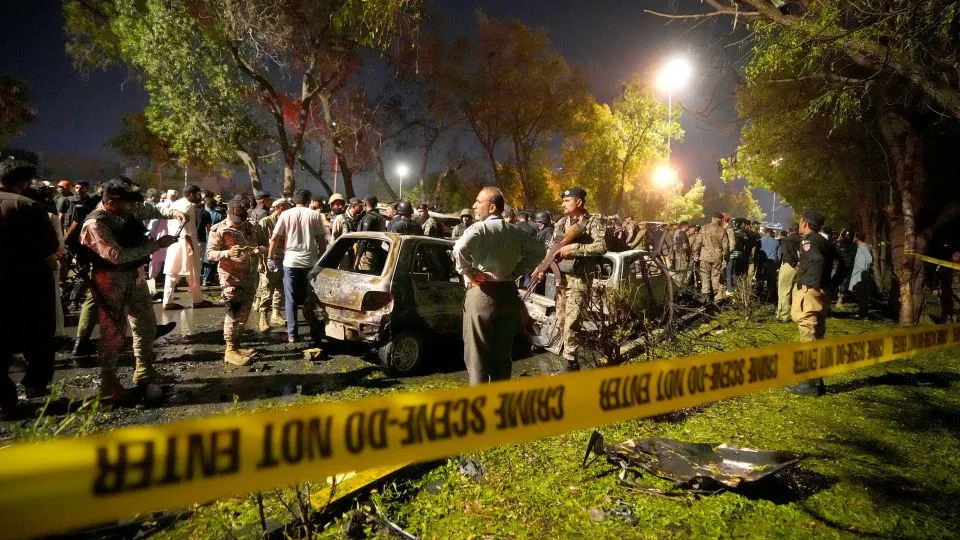
Security officials on Monday examined the site the Sunday night blast. - Fareed Khan/AP
Beijing has invested tens of billions of dollars in the China-Pakistan Economic Corridor (CPEC), a flagship Belt and Road project launched in 2015 that links China’s western Xinjiang region to Pakistan’s Gwadar port on the Arabian Sea with a network of roads, railways, pipelines and power plants.
But Chinese-funded projects have sparked resentment from locals in parts of Pakistan, who say they have benefited little from the developments. The anti-China sentiment is particularly strong among separatist groups in Balochistan.
The BLA, which claimed responsibility for Sunday’s attack, is the most prominent of several separatist groups in the restive southwest province.
Earlier this year, the BLA claimed responsibility for assaults on a Pakistani naval air base and a government complex outside the Chinese-funded strategic port of Gwadar.
In a separate incident in March, five Chinese workers and their local driver were killed in a suicide blast in northwest Pakistan, when a bomber rammed a vehicle into the workers’ convoy as it traveled from the capital to the Dasu dam, the country’s largest hydropower project.
Pakistan’s military said those attacks were aimed at destabilizing the country’s internal security and its relationship with China. They followed other violent incidents in recent years targeting Chinese nationals and projects.
In November 2018, the BLA claimed responsibility for an attack on the Chinese consulate in Karachi, which killed four people. Six months later, a separatist group attacked a luxury hotel in Gwadar, often used by Chinese nationals working at the port. In June 2020, the BLA said it was responsible for another deadly attack on the Pakistan Stock Exchange, in which a Chinese-led consortium owns a 40% stake.
In August last year, BLA militants opened fire on a Pakistani military convoy in Gwadar as it was escorting a delegation of Chinese nationals to a construction project. Two militants were killed and no harm was caused to any military personnel or civilians, according to the Pakistani military.
This story has been updated with additional information. CNN’s Azaz Syed and Saleem Mehsud in Islamabad contributed reporting.
Pakistan Orders Inquiry as Two Chinese Killed in Militant Attack
Ismail Dilawar
Mon 7 October 2024
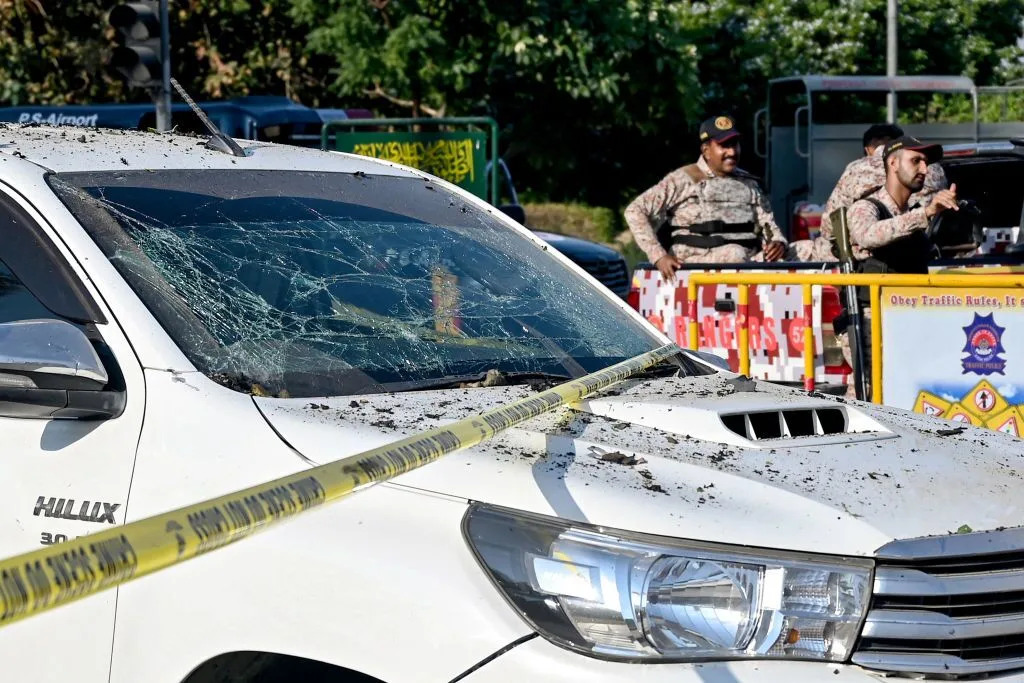
(Bloomberg) -- Pakistan is investigating an attack in the port city of Karachi that killed two Chinese citizens on Sunday, as the South Asian nation struggles to curb rising militancy targeting interests of its key economic partner.
Most Read from Bloomberg
Urban Heat Stress Is Another Disparity in the World’s Most Unequal Nation
Singapore Ends 181 Years of Horse Racing to Make Way for Homes
From Cleveland to Chicago, NFL Teams Dream of Domed Stadiums
What Do US Vehicle Regulators Have Against Tiny Cars?
For a Master of Brutalist Provocations, a Modest Museum Appraisal
The militants targeted a security convoy of Chinese workers working at the Port Qasim Electric Power Co. near Karachi’s airport, Chinese embassy in Pakistan said in a statement. Prime Minister Shehbaz Sharif condemned the attack and vowed to protect Chinese nationals, according to a statement by the Prime Minister’s Office on Monday.
Pakistani authorities are trying to protect about 2,500 Chinese nationals working on different projects from roads to power under the multi-billion dollar China-Pakistan Economic Corridor. The efforts are failing though. Militant attacks increased by 47% to 717 this year to September and killed 834 people in Pakistan, according to the data compiled by Pakistan Institute for Conflict and Security Studies.
Five Chinese nationals working at a power project in Pakistan’s northwest region were killed in an attack in March that Islamabad blamed on Tehreek-i-Taliban Pakistan, an offshoot of Afghanistan’s Taliban group. Baloch Liberation Army, a group of militants fighting security forces, claimed responsibility for the latest attack, Dawn newspaper reported,
China asked Pakistani authorities to probe the attack and protect its citizens and projects, its embassy said in a statement.
The attack comes a week before Pakistan hosts the Shanghai Cooperation Organisation Summit in Islamabad. The China-led SCO is a Eurasian grouping of countries that includes Russia, Kyrgyzstan and Tajikistan. India’s External Affairs Minister Subrahmanyam Jaishankar will attend summit, the first visit to Pakistan by an Indian foreign minister since 2015.
These attacks are also hurting efforts by the Sharif government to revive an economy with the help of the International Monetary Fund’s three-year $7 billion loan secured last month.
Sharif has said China along with Saudi Arabia and the UAE were key in rolling over loans and help Pakistan secure the IMF loan. It also comes at a time Pakistan is looking to inject some fresh momentum to projects under China’s Belt and Road Initiative.
--With assistance from Kamran Haider.

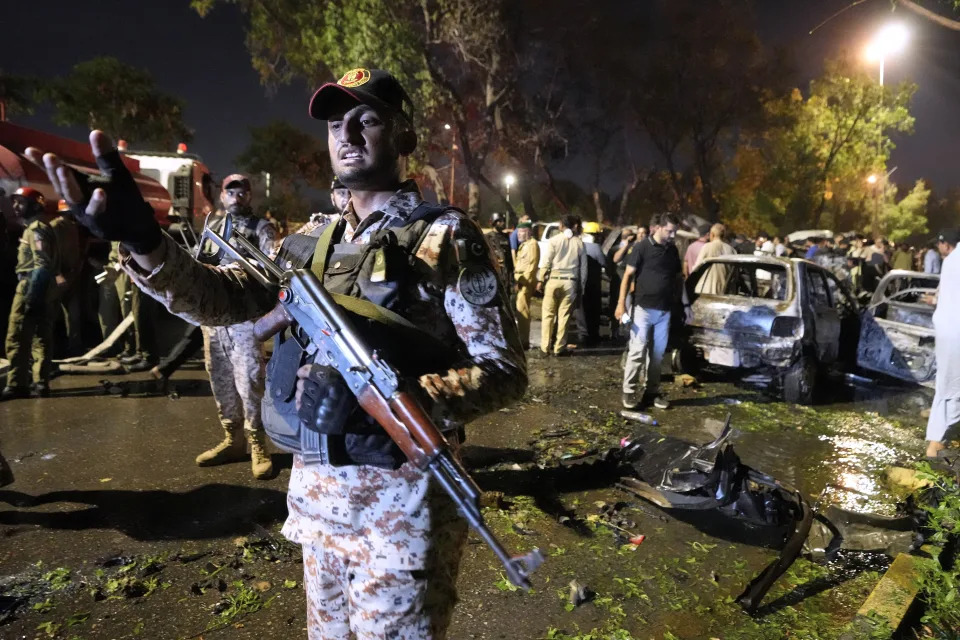
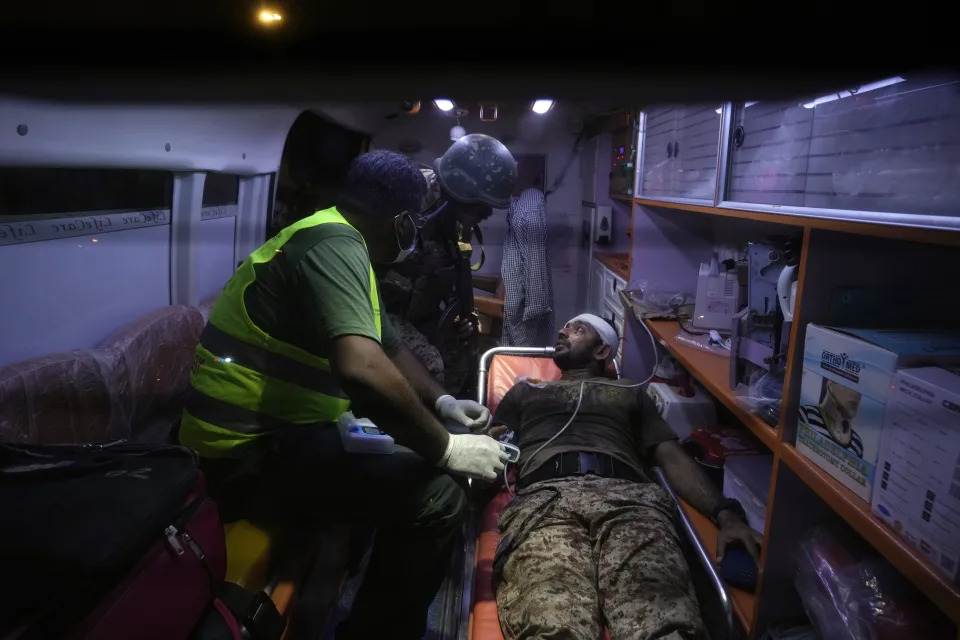
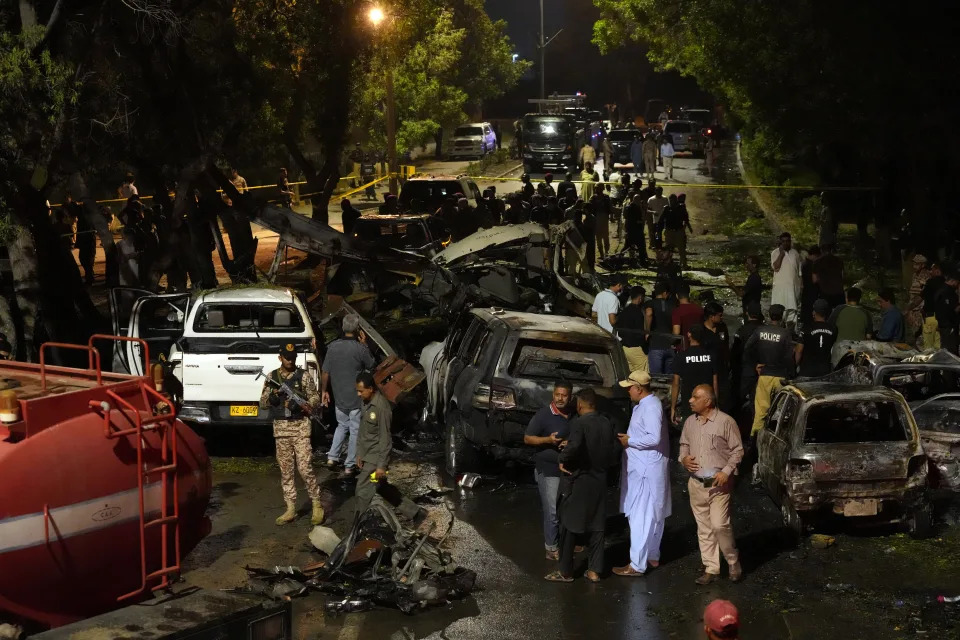

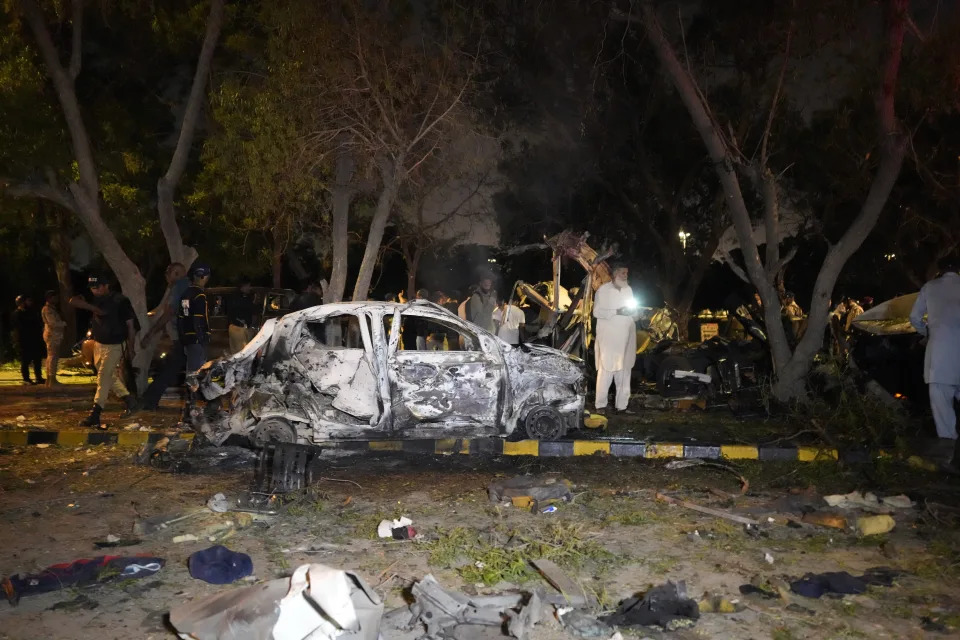
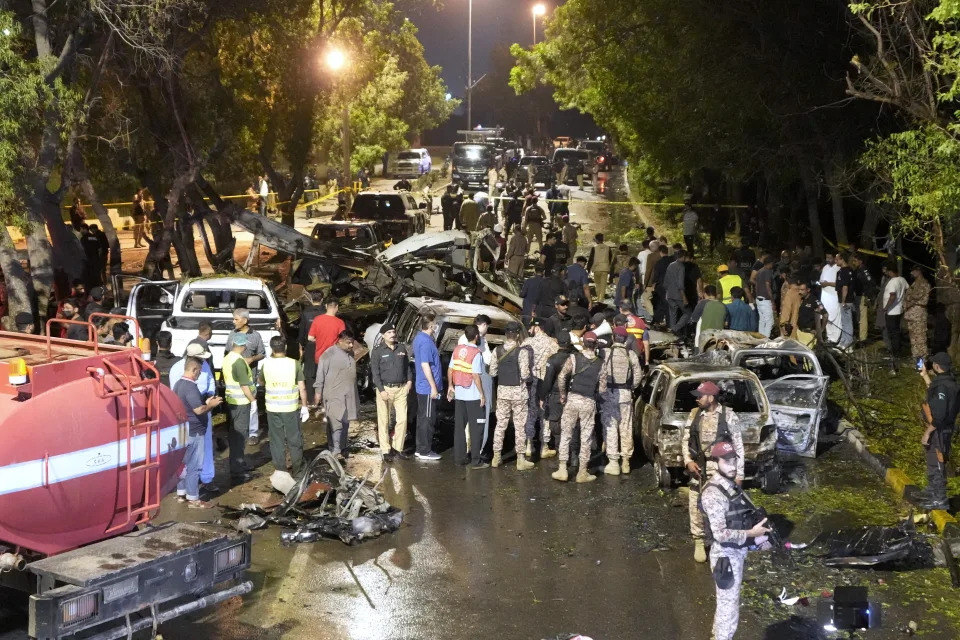
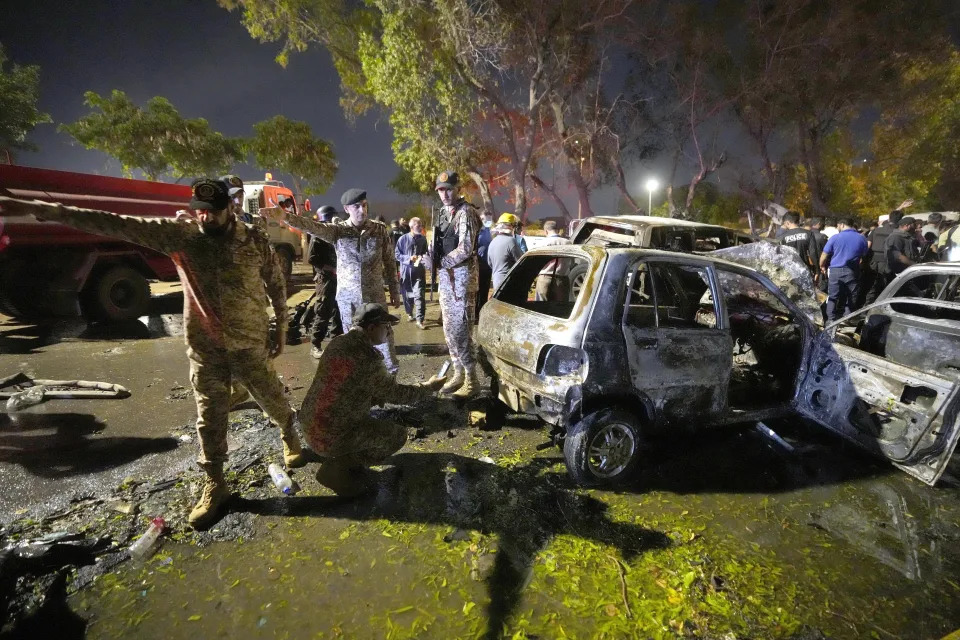
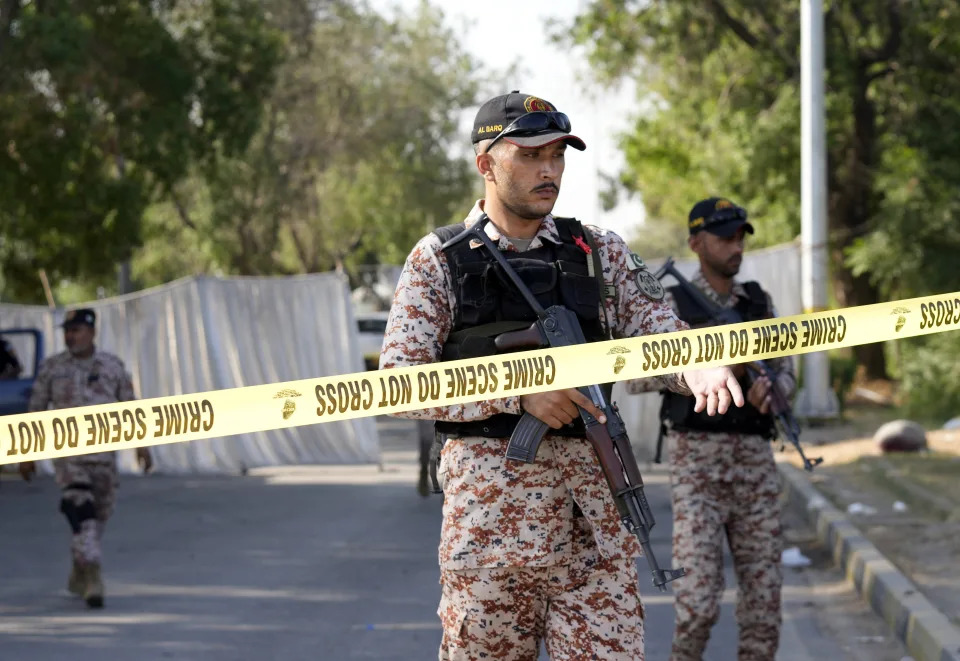

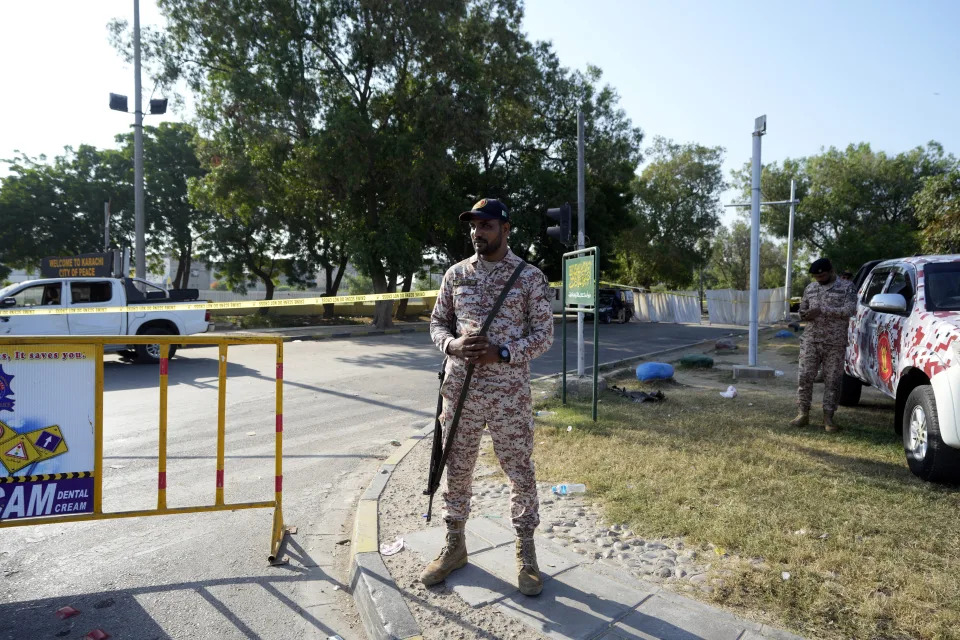
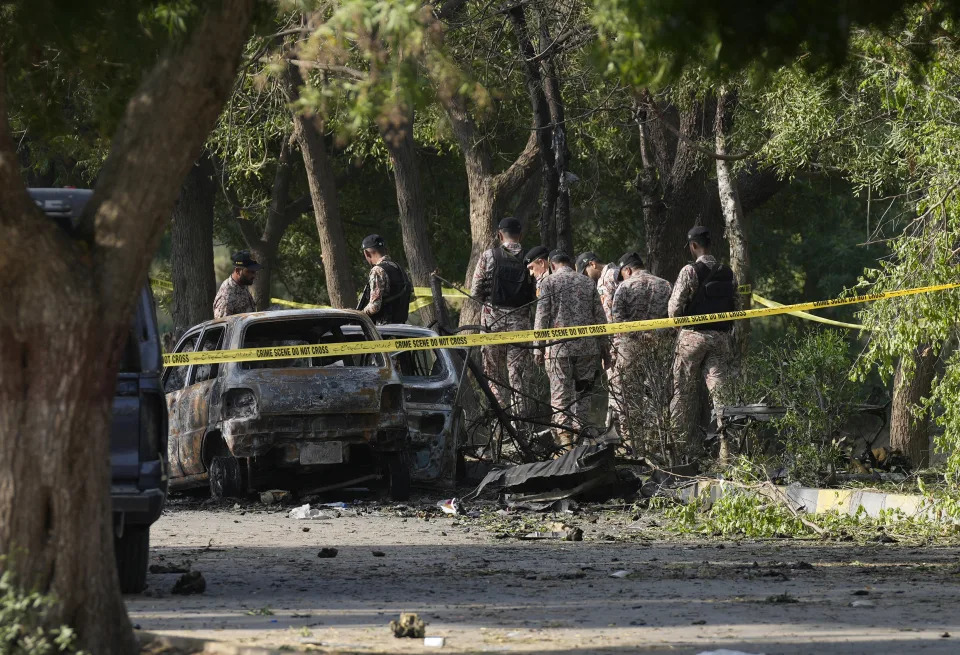
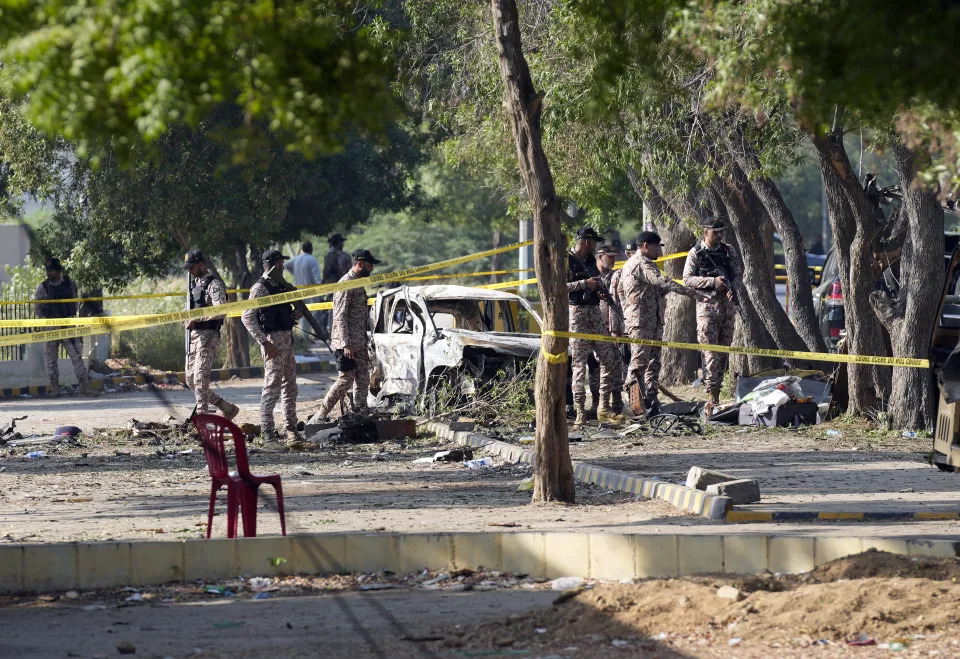
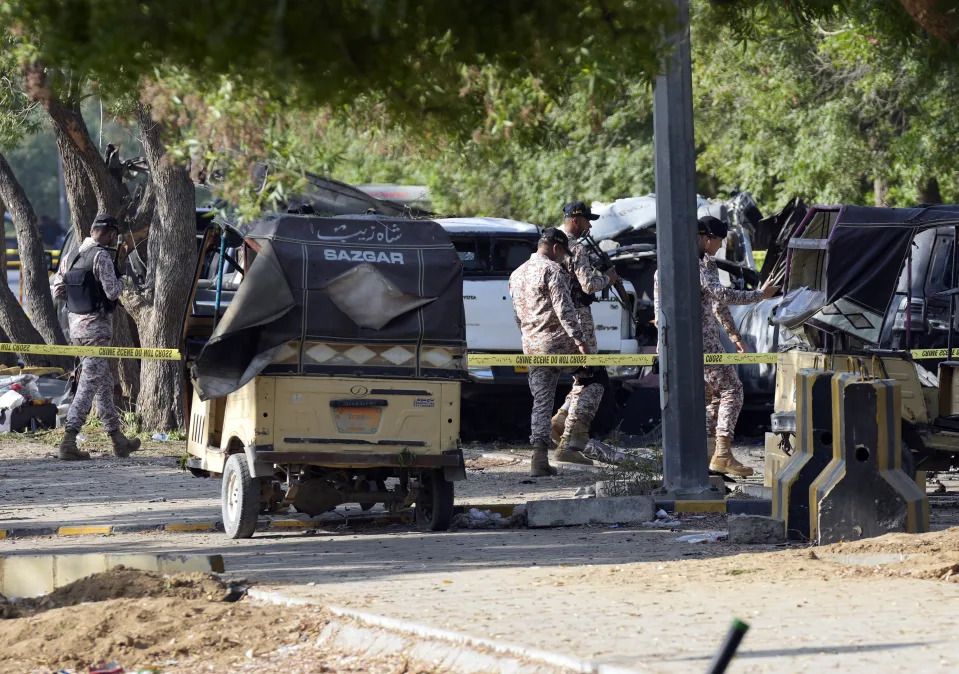
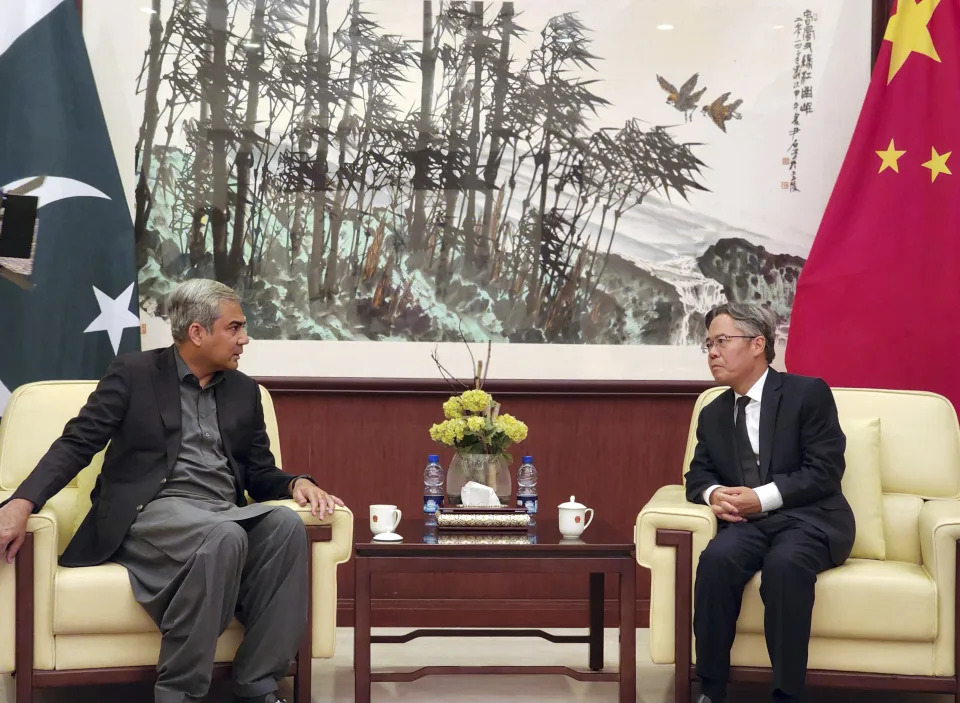
No comments:
Post a Comment